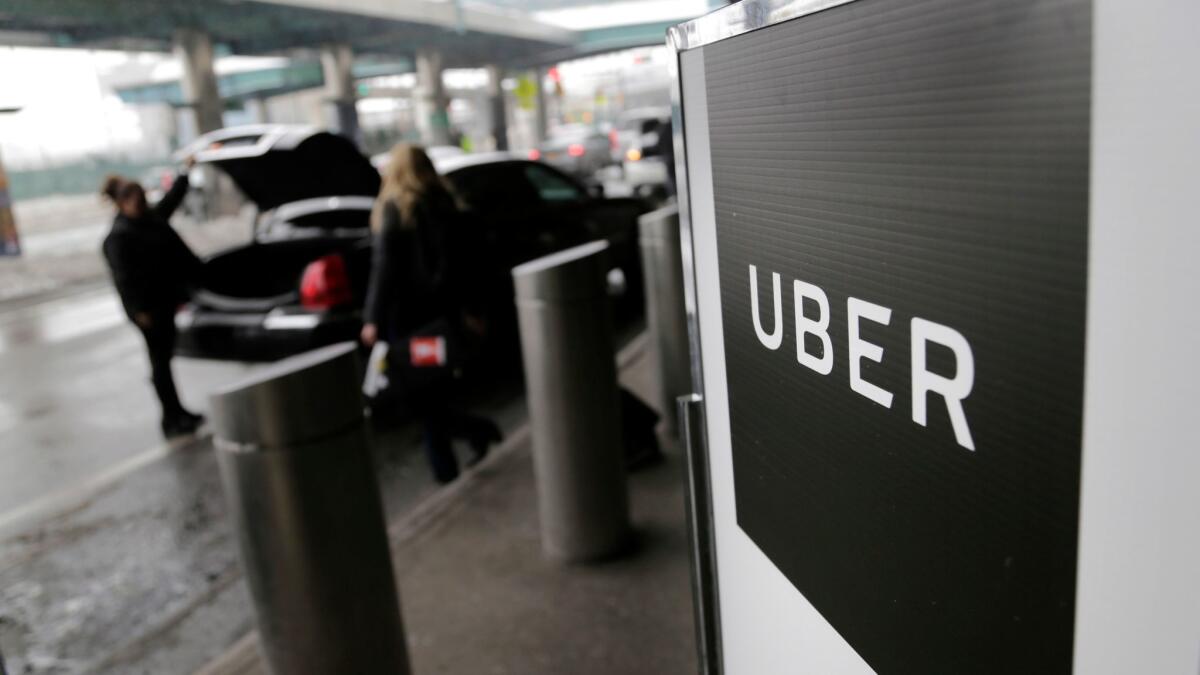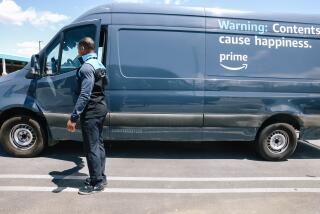Another setback for Uber: British judge rules drivers are workers, not contractors

- Share via
Uber lost the latest round in the battle over its operating model Friday, when a British panel ruled that the company’s drivers are workers, not independent contractors, in a decision with broad implications for the so-called gig economy.
The Employment Appeal Tribunal upheld a lower panel’s decision, agreeing that the two drivers in this case were “workers” under British law and therefore should receive the minimum wage and paid holidays. Uber said it would appeal.
Judge Jennifer Eady rejected Uber’s argument that the men were independent contractors, because the drivers had no opportunity to make their own agreements with passengers and the company required them to accept 80% of trip requests when they were on duty.
The tribunal, Eady wrote in her decision, found “the drivers were integrated into the Uber business of providing transportation services.”
The ride-hailing service said it has never required drivers in Britain to accept 80% of the trips offered to them and that drivers make well above the minimum wage. Employment lawyers expect the case to be heard by the Supreme Court next year.
“Almost all taxi and private hire drivers have been self-employed for decades, long before our app existed,” Tom Elvidge, Uber’s acting general manager for Britain, said in a statement. “The main reason why drivers use Uber is because they value the freedom to choose if, when and where they drive and so we intend to appeal.”
San Francisco-based Uber has expanded rapidly around the world by offering an alternative to traditional taxis through a smartphone app that links people in need of rides with drivers of private cars. That has drawn protests from taxi drivers who say Uber and similar services are able to undercut them because they don’t face the same licensing and regulatory requirements.
Though the company argued that the case applies to only two drivers, Uber has tens of thousands of drivers in Britain who could argue they deserve the same status as the former drivers covered by Friday’s decision. The court says about 40,000 drivers use the platform in Britain, though the company said the number had grown since the submission to 50,000.
“Uber cannot go on flouting U.K. law with impunity and depriving people of their minimum wage rights,” said James Farrar, who with Yaseen Aslam brought the case against Uber. “We have done everything we can, now it is time for the mayor of London, Transport for London and the Transport Secretary to step up and use their leverage to defend worker rights rather than turn a blind eye to sweatshop conditions.”
The ruling also has implications for more than 100,000 independent contractors in Britain’s so-called gig economy, where people work job-to-job with little security and few employment rights. Such employment, often for companies that use mobile phone apps to provide everything from food delivery to healthcare, has surged as the Internet cuts the link between jobs and the traditional workplace.
The case is just one of many focused on the rights of British workers in both the new and old economies — from Deliveroo food delivery drivers to plumbers.
The decision reflects a general trend of courts intervening in situations in which “the individuals involved are in a position of substantial inequality and in that case merit protection,” said Susannah Kintish, an employment attorney at Mishcon de Reya, which isn’t involved in the Uber case.
“There’s a definite sentiment that the law needs to step in and protect them,” she said.
Though the case is separate from London’s decision not to renew Uber’s license, observers are likely to watch Uber’s response to see if a company known for hard-hitting tactics is willing to change. Following the licensing decision, Uber’s new CEO, Dara Khosorwshahi, acknowledged that the company “got things wrong” in the past and said that it would change as it moves forward. Uber is also appealing that decision.
In the meantime, the ripple effects of the case will expand.
“We anticipate that tens of thousands drivers will now seek to make substantial backdated claims,” said Paul Jennings of Bates Wells Braithwaite, who represented the drivers. “Our clients have fought tirelessly to gain the rights that they clearly should have been afforded from the outset.”
More to Read
Inside the business of entertainment
The Wide Shot brings you news, analysis and insights on everything from streaming wars to production — and what it all means for the future.
You may occasionally receive promotional content from the Los Angeles Times.










